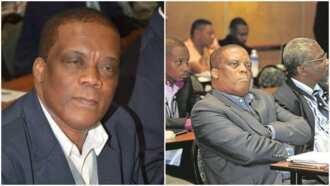Edwin Ijeoma, a professor of public sector economics at the University of Fort Hare, has been left stateless after his South African citizenship was revoked, Times Live reported.
Professor Ijeoma who used to be a Nigerian had reportedly renounced his Nigerian citizenship after arriving in South Africa in 1998 to study.
The academic's South African citizenship was revoked by the country’s ministry of home affairs after he was founding guilty of fraudulently relying on a bigamous marriage to a South African woman to obtain citizenship by naturalization.

Professor Edwin Ijeoma's. Photo credits: Twitter/@cbngov_akin1, Times Live
The professor's alleged citizenship fraud was exposed when he was joined in South Africa by a Nigerian woman named Anne Tomo.
The woman inadvertently exposed Ijeoma by attaching a copy of her 1993 marriage to the professor in Nigeria in her application for permanent residence in South Africa.
Bigamy committed
Following the development, the ministry of home affairs accused Professor Ijeoma of marrying the South African woman solely to acquire citizenship.
The ministry further stated that Ijeoma had lied on two previous occasions to South African immigration authorities.
The academic had reportedly listed Anne Ijeoma as his sister, not wife when asked to indicate his immediate family member who is still living in Nigeria.
Court finds Professor Ijeoma guilty
In protest, Ijeoma filed a suit against the home affairs ministry before the Bhisho high court.
The court, however, restated the ministry position as it found Ijeoma guilty of falsifying his marital status, thereby making his South African citizenship null and void.
The academic had claimed that as an African man, he believed he was entitled to marry more than one wife.The court noted that Professor Ijeoma had presented conflicting reasons for his bigamous marriage.
He also argued that he presented himself as single because he was not aware that South Africa recognised customary marriages.
According to the court, Ijeoma concealed his marriage in Nigeria from officials on three occasions: when he applied for permanent residence, when he got married to the South African woman and when he applied for citizenship.
Defending himself again, Professor Ijeoma claimed that he obtained a permanent residence permit because of his “good and sound character”, not through his marriage to the South African woman.
The court, however, countered his argument, saying it was stated clearly that he got the permanent residence permit because of the marriage.
No comments:
Post a Comment